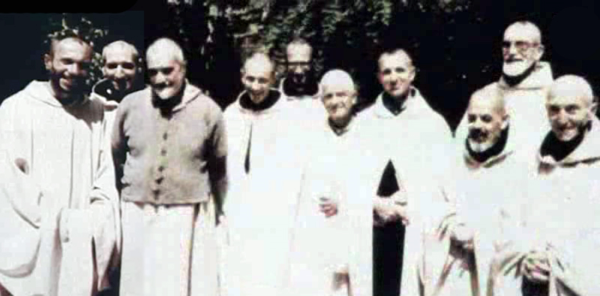
It's an intelligent film. And saying that is saying a lot. In an age where stupidity reigns supreme, making an intelligent film about faith allows us to rise above the waters and breathe new life into our thoughts; to find nourishment. Of Gods and Men exemplifies the lives of monks. The fact that the monks in the film live in Algeria is, in my opinion, secondary. It's secondary to sidestep the perennial debate of the "Clash of Civilizations." This is the debate that the privileged treat with contempt and that those less fortunate try to avoid every day.
To portray the lives of monks as exemplary… What a challenge! The cinema screen proves too small to depict the lives of monks. In an interview, Lambert Wilson expressed the fundamental difference between attending a service in a monastery and living alongside monks. He perfectly described the attitude of the viewer who spends an hour or two in the monastery church attending the liturgy. While it is clear that this faithful person participates in the Eucharist, it is equally clear that the life of the monastery remains completely beyond their grasp. The intimacy of the monastery. This hidden yet visible life; ineffable. Lambert Wilson was astounded by this ineffable quality. He sensed a great mystery; he was stunned by its simplicity.
The mystery is simple
A mystery surrounds the lives of monks. And this mystery lies in its simplicity. Words suddenly seem inadequate to explain this life. Because, compared to the modern world, this life is truly made of nothing. It is made of service, brotherhood, love, and adoration. What is that? What the modern world cannot understand, what it cannot confront, is the heart of the monks' lives. Mystery and adoration thunder with a terrible simplicity. Simplicity is the difference. Here we enter a world "other," far more foreign than the world of Avatar or E.T., a world entirely turned toward devotion, toward that voice, that voice of God that trembles, that rustles, and guides. The life of the monks is there.
What is visible in this attitude? Nothing. There is only the ineffable. Xavier Beauvois filmed it. No will can film grace. It is therefore not a question of will on his part. In fact, there may be will, but the success is not his. When grace allows itself to be spoken, it is because it has willed it. It is grace that makes grace possible. Xavier Beauvois had the good sense to leave all his preconceptions and the trappings of modern man at the door of his film. He let the camera capture this openness. God asks for nothing other than this openness. This heart, intact and ready to be loved. For the love of the heart of Jesus is nothing other than the love of the hearts of men. To the open heart, God appears.
What is grace?
Grace is the action of sincere prayer. And God's response to that prayer and that expectation. The monks in the film express this perfectly. Through the Liturgy of the Hours, through the acceptance of simplicity, knowing that love resides within it. When Father Christophe "can no longer hear" anything and complains to Father Christian de Chergé (Lambert Wilson), no explanation is given. Explain what? It's easy to understand. Father Christophe is mired in his own desire to leave the monastery; his chosen world is becoming too heavy to bear, too much to endure. He is there for peace; he wants to live again outside of this violence. He bends a knee. He asks why. He fears suffering. He teeters on the brink of apostasy. His doubts don't completely vanish, but he will trust again. He will accept simplicity. Simplicity demands infinite courage. And this is happening more and more as the modern world becomes increasingly technical, and merges with the will to power, which serves technology.
Of Gods and Men is simple and courageous. It addresses all facets of a monk's life, even as it portrays them amidst a storm of violence. But doubts, fears, sorrows, and silences always resonate, in times of peace as in times of war.
The final part of the film shows the monks living their perfect Christian lives, mirroring the earthly life of Christ. The monks experience a Last Supper from which the traitor is absent, and their ascent to Golgotha takes place amidst heavy snowfall. A final effort. A final burst of spiritual strength. Before entering eternal glory.
1. Overview. September 2010.
2. Blessed Cardinal Newman said: Grace […] has renewed nature, it does not destroy it nor suspend it, but raises it to a higher order.
Leave a comment